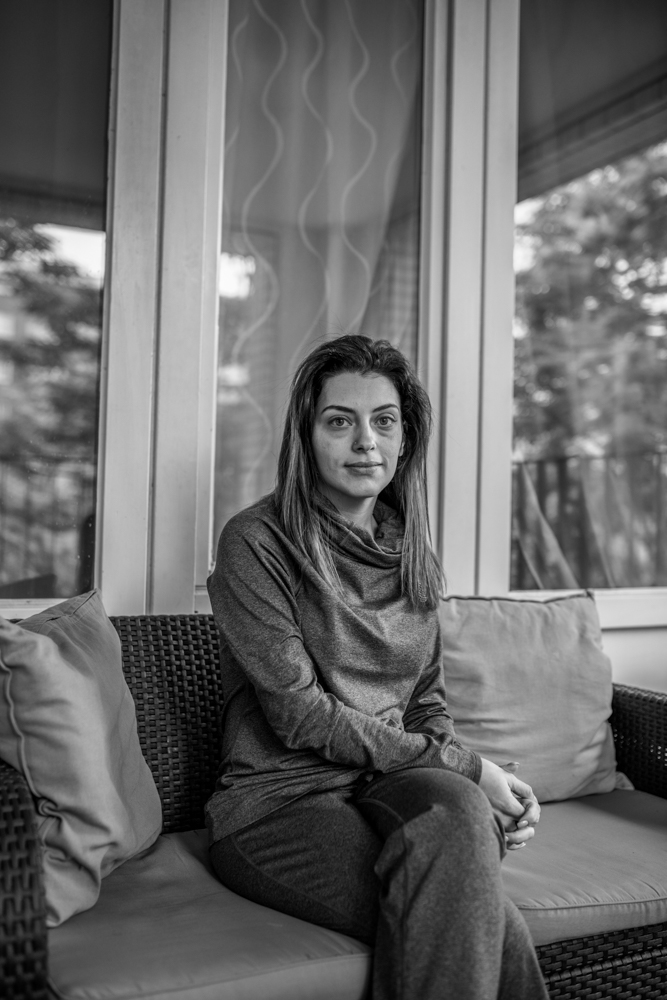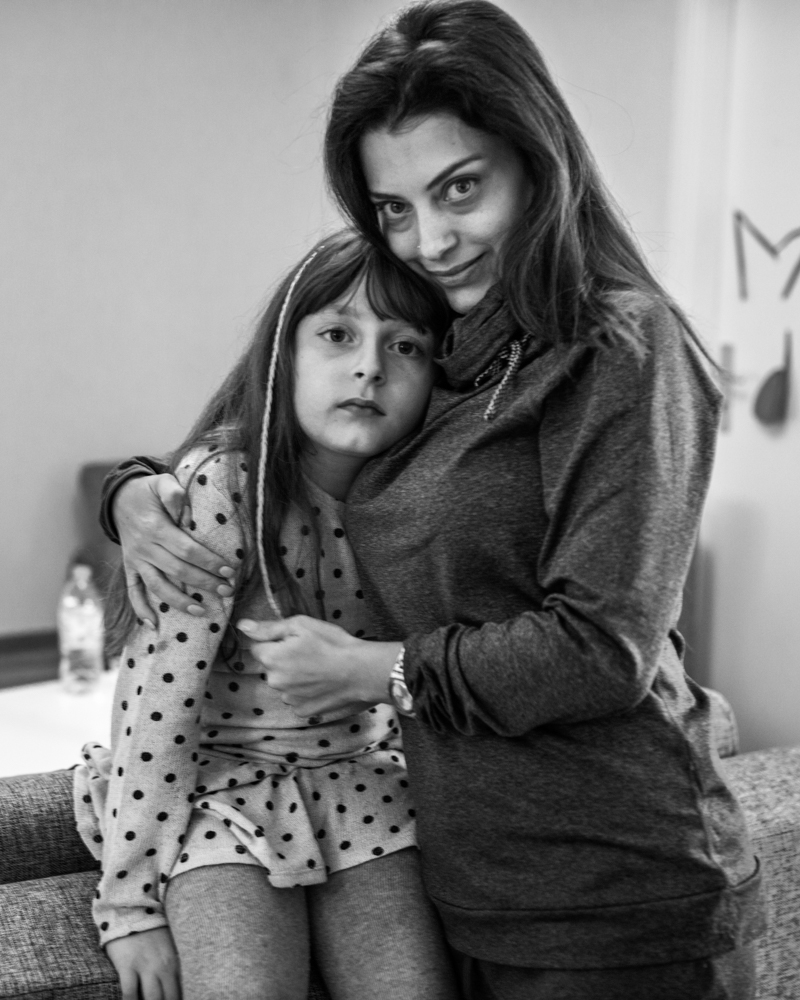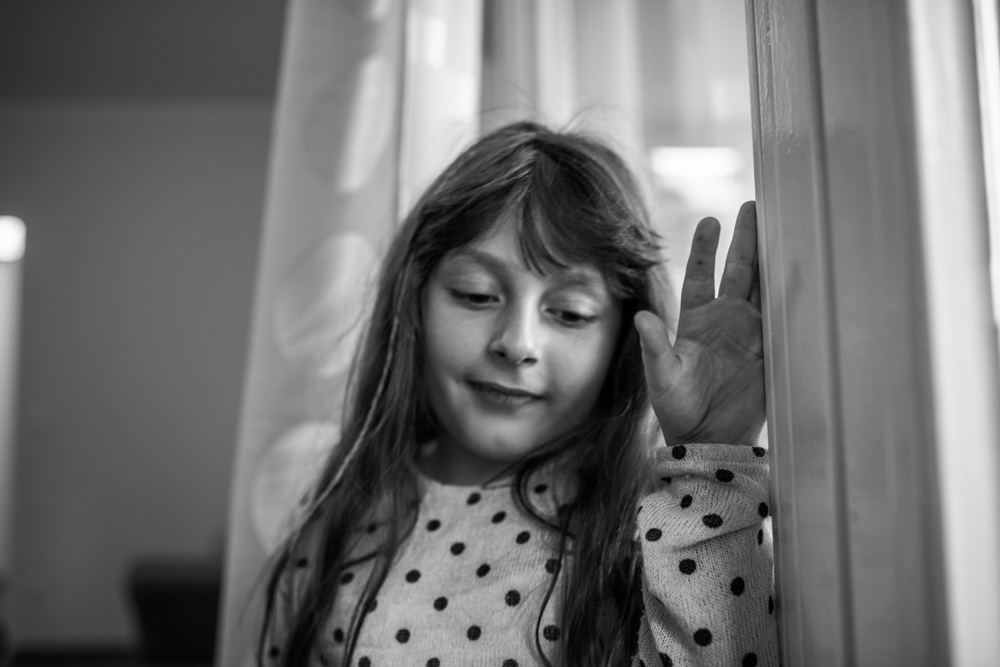Medea Daghestani
Age: 31 years old
Interviewed in: Berlin, Germany
Date: October 17, 2015

Medea in her apartment in Postdamer Platz, Berlin. © Miguel Winograd
My name is Medea Daghestani, and I am from Homs, the capital of the revolution.
My life in Syria before the revolution was a calm life. I graduated from the university. I had a good job. I was a teacher. I had friends, family and everything was good and calm. I am from a political family. My father was arrested for eight years but not under Bashar [al Assad] but under Hafez, the ex-president. So we were in the opposition even before the revolution. We hated this regime. I don't think there is a regime in Syria, I think there is a mafia of a few people who control everything: the economy, politics. There is corruption everywhere. That is why I have hated this government and this regime since I was a little girl.
When the Arab spring started, especially in Tunisia and Egypt, we were looking at this and I never thought this would happen in Syria. I thought that Syria has such a strong military and people are so scared and they would never engage in these types of things. I always wished that something like that would happen, but when it all started it was a shock. It all began on the 18th of March 2011. I didn't participate in that demonstration because it happened suddenly. There were 300 people in the Khalid ibn al-Walid mosque. Homs is a small city so the next week people started gathering in the clock square. I went there with my father and we participated in that demonstration. It was a big one. After that I started going to the demonstrations every week, sometimes alone, sometimes with my friends.
We were listening to the news all the time, so my daughter started to memorize the chants about how the people wanted to overthrow the regime. One day she started chanting that in her school. She made all the kids go behind her and they started to chant in Arabic that the people want to overthrow the regime. So the teacher called me and said to me that this is a very dangerous thing and a serious issue. And my daughter, you know, is only four years old, so I was laughing and telling the teacher that she was only four years old and she was not going to overthrow the regime. The teacher said that this is a very serious issue, and she couldn't do that.
So I started to tell Zia [Medea's daughter] that it is ok to say that but not in certain places, that when we went through a checkpoint she shouldn't. I started to teach her indirectly how to lie and to have a double character, just as I had learned growing up. I grew up with a double character: in the house we hated Hafez al Assad, but in the school I had to clap for him because I would be arrested if I didn't do that, or my mother would get arrested. So I started teaching my daughter how to do that. I hated this because I didn't want my daughter to have a double character. I want her to be able to say what she thinks, wherever she wants, not to lie.
My friends and me were observing what was happening. And we heard the regime saying that this is not a revolution, that this is a group of terrorists and extremists who want to kill the minority and that the government was protecting the minority. I am certainly not an extremist: I am a moderate woman. I don't cover myself. I am not religious at all. And within the revolution I have many friends from minority sects—Alawite, Murshidian, Christian—and they all know that this revolution is for freedom, democracy and dignity, it is not about extremism and Islam as the regime claims. So we decided to organize our own movement more. We started to move in a more organized way and we started to appear on TV to show that we were all from religious minorities and that we were all against the regime. We did a good job: lots of demonstrations, statements and those types of things.

Medea and her daughter Zia. © Miguel Winograd
In November [2011] I left Syria to attend a 5-day workshop and learn how to document what was going on so that it could be used as evidence in a national court, not just as a human rights violation. At that time, my father's friend told him that the regime and the security services were looking for me, that they wanted me and that it was very dangerous for me to go back. Of course before that the military, the security services, attacked my house twice, one time with weapons and everything and they scared my daughter. She was so scared. They also had me fired. They went to the school and told the director that I was so dangerous for the kids and he fired me on the spot.
Then I went to Turkey and worked with a civil organization. We made a media project called Basma. It was an organization to let civilian voices tell the world what was going on. We did a lot of good work that I am still proud of, like Homs Under Siege, and other projects. Then I worked with another organization. I was living in Istanbul but my worked required me to go to Syria a lot and come back. So I was crossing the border a lot and contacting activists inside. I worked there for three years. But I had am problem with the passports because my daughter's passport was about to expire, her father was not there and it is very complicated to renew a child's passport without the father. I didn't want to be stuck with her in Turkey without any papers and that is why I came to Germany.
When I came here it was difficult at the beginning. It's a new country, a new language, and a new society. My family was not with me. I came here in 2014, I am here now for a year and three months. But I am good now. I have friends. I have adapted here. I am learning the language. My daughter is in a very nice school. It is not easy to apply for asylum here. When you apply they send you to a region chosen randomly by a computer. So they sent me to a camp for 15 days and then they transferred me to a small city named Meiningen. They gave me a house and in the house there was a girl, a partner. I was very lucky because this girl was from my hometown, from Homs. I was so happy with her. I spent about 6 months there. My daughter was in school. And I finished all my paperwork, took my passport and my residency permit and moved to Berlin. I found a good school that accepted my daughter and an apartment. I took a long time but it was ok. You have to have a lot of patience with the bureaucracy in Berlin and Germany. But it is good because we don't have any other choice. We are coming from a war and we don't have the luxury to demand things faster.
Do you still keep in touch with people in Syria? Are you active in the community?
I am not active as I used to be but I still have my friends and my contacts and am working in a small team.
What about here in Germany? How have you related to this new wave of refugees?
I help sometimes in translation because I speak English and Arabic. Most of the social workers that work in the camps speak good English so I translate between the Syrians and them. I also understand the culture of Syria. You know the European culture is one thing and the Syrian culture is something else, so I can make a bridge between them so that they are able to understand and have a good way communicate with each other.
How have the German people treated you? Do you feel welcome or has there been some type of tension?
In the Eastern area there was something. It was not tension. When they see me its ok, because they can't guess from where I am, but when I start speaking English they are a little weird, they are not used to seeing lots of foreigners, maybe that is the reason. But here in Berlin people here have been so nice to me, I feel that I am so welcome. Everyone wants to help, they help volunteer in the camps and help out. I am very lucky. I am surrounded by great people. It has been a very positive experience, especially here in Berlin.

Zia, Medea's daughter, is 6 years old and speaks Arabic, English, and Turkish. She is currently learning German. © Miguel Winograd